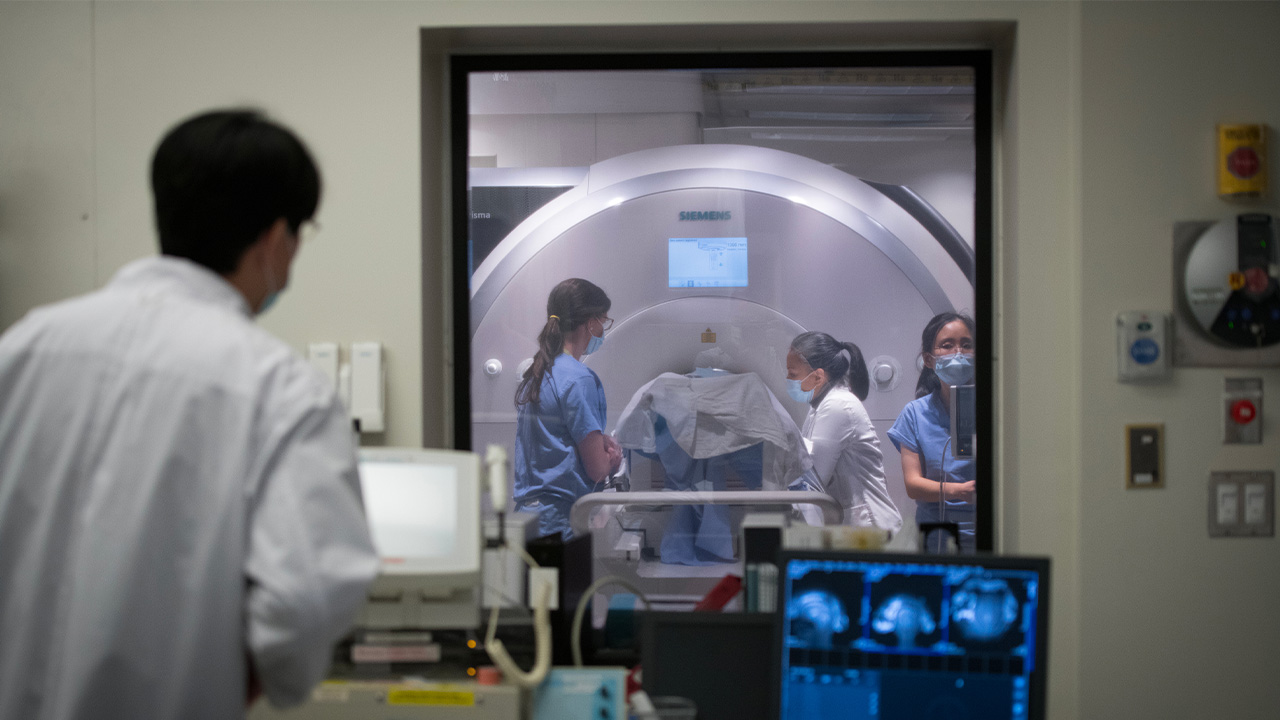World-first study highlights potential of focused ultrasound in the detection of brain cancer biomarkers through liquid biopsy
In a first-ever study, Sunnybrook researchers have demonstrated that MRI-guided focused ultrasound technology can improve the detection of brain cancer biomarkers with the temporary opening of the blood-brain barrier to aid liquid biopsy, also known as virtual biopsy. In the study, patients with glioblastoma (GBM), an aggressive cancer that forms in the brain or spine, had a liquid biopsy collected following a focused ultrasound treatment. A liquid or virtual biopsy is a blood test that can reveal DNA that tumours typically shed into the bloodstream. Clinically, it is available for other cancers but not for brain cancer. This trial shows that liquid biopsy could provide a less invasive way to monitor brain cancer.
Focused ultrasound is image-guided technology that uses ultrasound energy to target areas in the brain without the use of scalpels or incisions to the skin. The blood-brain barrier is a protective wrap that restricts the movement of compounds in and out of the brain.
The novel study was published in Neuro-Oncology.
“This is the first clinical study to demonstrate the potential of MRI-guided focused ultrasound to support liquid biopsy for the brain,” says Dr. Nir Lipsman, the study’s principal investigator, neurosurgeon and director of the Harquail Centre for Neuromodulation at Sunnybrook. “While we are still in the early stages of investigation, our study findings combining focused ultrasound technology with blood sample analysis open up the possibility for less invasive diagnostic strategies in the future which could potentially expand beyond cancer to include neurodegenerative diseases.”
“Currently, the only other ways to diagnose brain cancer are through invasive brain surgery,” says Dr. James Perry, a co-investigator, neuro-oncologist and scientist in the Odette Cancer Research Program and Hurvitz Brain Sciences Program at Sunnybrook. “To detect cancer biomarkers through a blood test could provide a diagnosis for patients and either avoid an operation or allow the surgery to be planned in advance. This might be helpful for some patients who may be too sick for surgery or have tumours located in areas of the brain that are difficult to access. The hope is for a way to detect and monitor brain tumours frequently, which cannot be done with invasive approaches.”
MRI-guided focused ultrasound liquid biopsy
In most cancers, tumours shed what is known as cell-free DNA (cfDNA) into the bloodstream, considered to be signals of the disease which can be measured through a blood test.
For brain tumours, it is difficult to detect the amount of cfDNA because of the blood-brain barrier which limits the release of cfDNA and other components into the bloodstream. The blood-brain barrier can also prevent helpful medications from entering the brain, including chemotherapy.
Nine participants were treated in a clinical trial investigating the use of focused ultrasound to open the blood brain barrier to enhance the delivery of chemotherapy to brain tumours.
In the study, participants were fitted with a special headframe to secure the focused ultrasound helmet which directs the ultrasound waves to a specific target in the brain. Each participant would remain in an MRI receiving low intensity focused ultrasound to open the blood-brain barrier.
Prior to receiving focused ultrasound treatment, microbubbles were injected into the blood stream. The low intensity focused ultrasound causes the microbubbles to vibrate, which leads to the temporary opening of the blood-brain barrier allowing for the delivery of chemotherapy to the tumor region.
As an exploratory measure, blood samples were collected within hours before and after focused ultrasound.
Blood tests determined cfDNA was detected up to seven times more after focused ultrasound treatment compared to before. Investigators note this increase was not seen in non-tumour patients receiving focused ultrasound for other diseases and attribute it to more cfDNA being released into the bloodstream with the temporary breach of the blood-brain barrier.
“This is an exciting and clinically meaningful development,” says Dr. Arjun Sahgal, co-investigator, radiation oncologist and scientist in Sunnybrook’s Odette Cancer Centre. “As we learn more about changing genetic profiles based on treatment response, this liquid biopsy approach may also provide a new area of research with respect to treatment monitoring and allow for individualized care or potentially more personalized surgical decision making for patients.”
“In addition to improving techniques for detecting biomarkers in blood, is the unique potential of image-guided focused ultrasound in targeting tumours to selectively target different regions of the tumour for sampling and analysis,” explains Dr. Ying Meng, the study’s first author and a neurosurgery resident at Sunnybrook.
Sunnybrook is a Focused Ultrasound Centre of Excellence. The only Canadian site of 10 globally, as designated by the Focused Ultrasound Foundation.
Innovation, research, collaboration and the discovery of novel interventions for the world’s most complex brain conditions are integral drivers for cross-disciplinary teams in brain sciences at the new Garry Hurvitz Brain Sciences Centre, which is being built at Sunnybrook.
“The potential of focused ultrasound continues to evolve. This study is an early step in focused ultrasound use beyond therapy to a diagnostic tool,” says Dr. Kullervo Hynynen, Vice President of Innovation at Sunnybrook, and a pioneer in focused ultrasound. “As research in this innovative technology continues and findings refined, this paves the way for exciting future possibilities in treatment and detection of disease in the future.”
A key driver of Sunnybrook’s research in focused ultrasound is philanthropic investment. This study is funded by the Focused Ultrasound Foundation, the Harquail Centre for Neuromodulation and INSIGHTEC.
Read the full study.
For more information about focused ultrasound at Sunnybrook Health Sciences Centre, visit sunnybrook.ca/focusedultrasound.
Learn more about Sunnybrook’s Harquail Centre for Neuromodulation.
Learn more about Central Nervous System Care, Odette Cancer Centre at Sunnybrook.
Media contacts:
Jennifer Palisoc
Communications Advisor
Jennifer.palisoc@sunnybrook.ca
Samantha Sexton
Communications Advisor
Samantha.sexton@sunnybrook.ca



